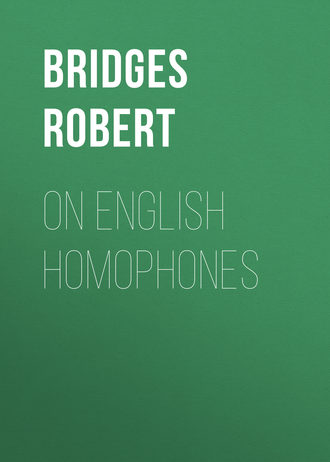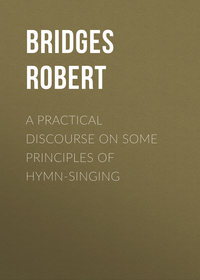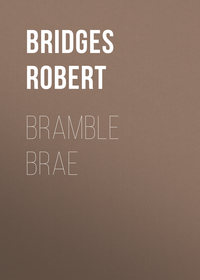 полная версия
полная версияOn English Homophones
where we have not received written confirmation of compliance. To
SEND DONATIONS or determine the status of compliance for any
particular state visit http://pglaf.org
While we cannot and do not solicit contributions from states where we
have not met the solicitation requirements, we know of no prohibition
against accepting unsolicited donations from donors in such states who
approach us with offers to donate.
International donations are gratefully accepted, but we cannot make
any statements concerning tax treatment of donations received from
outside the United States. U.S. laws alone swamp our small staff.
Please check the Project Gutenberg Web pages for current donation
methods and addresses. Donations are accepted in a number of other
ways including including checks, online payments and credit card
donations. To donate, please visit: http://pglaf.org/donate
Section 5. General Information About Project Gutenberg-tm electronic
works.
Professor Michael S. Hart is the originator of the Project Gutenberg-tm
concept of a library of electronic works that could be freely shared
with anyone. For thirty years, he produced and distributed Project
Gutenberg-tm eBooks with only a loose network of volunteer support.
Project Gutenberg-tm eBooks are often created from several printed
editions, all of which are confirmed as Public Domain in the U.S.
unless a copyright notice is included. Thus, we do not necessarily
keep eBooks in compliance with any particular paper edition.
Most people start at our Web site which has the main PG search facility:
http://www.gutenberg.net
This Web site includes information about Project Gutenberg-tm,
including how to make donations to the Project Gutenberg Literary
Archive Foundation, how to help produce our new eBooks, and how to
subscribe to our email newsletter to hear about new eBooks.
1
Homophone is a Greek word meaning 'same-sounding', and before using the relative word in this double way I have preferred to make what may seem a needless explanation. It is convenient, for instance, to say that son and heir are both homophones, meaning that each belongs to that particular class of words which without context are of ambiguous signification: and it is convenient also to say that son and sun and heir and air are homophones without explaining that it is meant that they are mutually homophonous, which is evident. A physician congratulating a friend on the birth of his first-born might say, 'Now that you have a son and heir, see that he gets enough sun and air'.
2
Such words have no technical class-name; they are merely extreme examples of the ambiguity common to most words, which grows up naturally from divergence of meaning. True homophones are separate words which have, or have acquired, an illogical fortuitous identity.
3
It is probable that in Tyndal's time the awkwardness was not so glaring: for 'beam' as a ray of light seems to have developed its connexion with the eye since his date, in spite of his proverbial use of it in the other sense.
4
In Skeat's Etymological Dictionary there is a list of homonyms, that is words which are ambiguous to the eye by similar spellings, as homophones are to the ear by similar sounds: and that list, which includes obsolete words, has 1,600 items. 1,600 is the number of homophones which our list would show if they were all only doublets.
5
The following words in List 1 involve wr > w, write, wrach, wrap, wring, wrung, wreck, wrest, wreak, wrick.
6
Other similar words occurring in other sections are—awe, awl, ought, bawd, fought, gaud, gauze, haw, caw, cause, caught, lawn, paw, saw, sauce, sought, taut, caulk, stalk, alms, balm;—their correspondents being, oar, orle, ort (obs.), board, fort, gored, gores, hoar, core, cores, court, lorn, pore, sore, source, sort, tort, cork, stork, arms, barm.
7
Other similar proper names of species, &c., which occur in some one of the other sections of the list: ant, bat, bear, bee, beet, beetle, beech, box, breeze, date, dock, daw, duck, deer, elder, erne, fir, flea, flag, fluke, hare, horse, hawk, hop, caper, carrot, couch, cricket, currant, leech, lichen, mace, maize, mint, mole, pear, peach, pink, pie, pine, plum, plane, pulse, rabbit, rye, rush, rape, rail, reed, roe, roc, rue, sage, seal, sloe, sole, spruce, stork, thyme, char, whale, whin, yew. Also cockle.
8
The homophones sun = son. There is a Greek epigram on Homer, wherein, among other fine things, he is styled,
Ελλανων βιοτη δευτερον αελιον
which Mackail translates 'a second sun on the life of Greece'. But second son in English means the second male child of its parents. It is plain that the Greek is untranslatable into English because of the homophone. The thing cannot be said.
Donne would take this bull by the horns, pretending or thinking that genuine feeling can be worthily carried in a pun. So that in his impassioned 'hymn to God the Father', deploring his own sinfulness, his climax is
But swear by thyself that at my death Thy Sonne
Shall shine as he shines now,
the only poetic force of which seems to lie in a covert plea of pitiable imbecility.
Dr. Henry Bradley in 1913 informed the International Historical Congress that the word son had ceased to be vernacular in the dialects of many parts of England. 'I would not venture to assert (he adds) that the identity of sound with sun is the only cause that has led to the widespread disuse of son in dialect speech, but I think it has certainly contributed to the result.'
9
There is a coincidence of accidents—that the Arabic sign for zero is the same with our letter O, and that the name of our letter O (= owe) is the same as the present tense of ought, which is the vulgar name (for nought) of the Arabic zero, and that its vowel does not occur in the name of any cipher.
10
Wherever this is not so—as in rhétoric, rhetórical, rhetorícian, cómpany, compánion, &c.—we have a greater freedom in the use of the words. Such words, as Dr. Bradley points out, giving Cánada, Canádian as example, are often phonetic varieties due to an imported foreign syntax, and their pronunciation implies familiarity with literature and the written forms: but very often they are purely the result of our native syllabising, not only in displacement of accent (as in the first example above) but also by modification of the accented vowel according to its position in the word, the general tendency being to make long vowels in monosyllables and in penultimate accents, but short vowels in antepenultimate accents. Thus come such differences of sound between opus and opera, omen and ominous, virus and virulent, miser and miserable, nation and national, patron and patronage, legal and legislate, grave and gravity, globe and globular, grade and gradual, genus and general, female and feminine, fable and fabulous, &c. In such disguising of the root-sound the main effect, as Dr. Bradley says, is the power to free the derivative from an intense meaning of the root; so that, to take his very forcible example, the adjective Christian, the derivative of Christ, has by virtue of its shortened vowel been enabled to carry a much looser signification than it could have acquired had it been phonetically indissociable from the intense signification of the name Christ. This freedom of the derivative from the root varies indefinitely in different words, and it very much complicates my present lesser statement of the literary advantage of phonetic variety in inflexions and derivatives.
The examples above are all Latin words, and since Latin words came into English through different channels, these particular vowels can have different histories.
11
It would follow that, supposing there were any expert academic control, it might be possible to save some of our perishing homophones by artificial specialization. Such words are needed, and if a homophone were thus specialized in some department of life or thought, then a slight differential pronunciation would be readily adopted. Both that and its defined meaning might be true to its history.
12
A Modern English Grammar on Historical Principles, by Otto Jespersen, Heidelberg, 1909. Streitberg's Germanische Bibliothek, vol. i, p. 441.
13
To give an example of this. In old Greek we and you were ημεις and υμεις: and those words became absolutely homophonous, so that one of them had to go. The first person naturally held on to its private property, and it invented sets for outsiders. Now the first step towards this absurdest of all homophonies, the identity of meum and tuum, was no doubt the modification of the true full u to ii. The ultimate convenience of the result may in itself be applauded; but it is inconceivable that modern Greek should ever compensate itself for its inevitable estrangement from its ancient glories.
14
The words aural and oral are distinguished in the pronunciation of the North Midlands and in Scotland, and the difference between the first syllables is shown in the Oxford dictionary. In Southern English no trace of differentiation remains.
15
Some of the words in this table are also in the last list. This list is an attempt to tabulate words falling out of use or seldom heard now in the conversation of average educated persons who talk Southern English or what is called P.S.P. (see p. 38); to some of them the word may be unknown, and if it is known, they avoid using it because it sounds to them strange or affected. It is difficult to prove that any particular word is in this condition, and the list is offered tentatively. It is made from Jones' dictionary, which is therefore allowed to rule whether the word is obsolescent rather than obsolete: some of these seem to be truly obsolete. Some will appear to be convincing examples of obsolescence, others not; but it must be remembered that the fact of a word being still commonly heard in some district or trade (though that may seem to show that it is in 'common use') is no evidence that it is not dying out; it is rather evidence that it was lately more living, which is the same as being obsolescent.
16
A Phonetic Dictionary of the English Language, by Hermann Michaelis, Headmaster of the Mittelschule in Berlin, and Daniel Jones, M.A., Lecturer on Phonetics at University College, London, 1913. There is a second edition of this book in which the words are in the accustomed alphabetical order of their literary spelling.
17
I am not likely to forget it or to minimize it, for it is my own indictment against Mr. Jones' system, and since his practice strongly supports my contention I shall examine it and expose it (see p. 43); but the objection here raised is not really subversive of my argument here, as may be judged from the fact that the Oxford University Press has adopted or countenanced Mr. Jones' standard in their small popular edition of the large dictionary.
18
This is a very common condition. The habitual pronunciation is associated in the mind with the familiar eye-picture of the literary printed spelling so closely that it is difficult for the speaker to believe that he is not uttering the written sounds; but he is not competent to judge his own speech. For instance, almost all Englishmen believe that the vowel which we write u in but, ugly, unknown, &c., is really a u, like the u in full, and not a disguised a; and because the written s is sometimes voiced they cannot distinguish between s and z, nor without great difficulty separate among the plural terminations those that are spoken with an s from those that are spoken with a z. I was shocked when I first discovered my own delusions in such matters, and I still speak the bad Southern English that I learnt as a child and at school. I can hardly forgive my teachers and would not myself be condemned in a like reprobation.
19
A fair list might no doubt be made; the most amusing item would be—Ophelia = aphelia: then illusion = elusion, paten = pattern, seaman = seamen, phial = file, custody = custardy, and of course verdure = verger and fissure = fisher. It would also allow partition = petition, proscribe = prescribe, and upbraid = abrade! I take these from the first edition.
20
The two editions of Jones' dictionary do not exactly correspond, e.g. in the first edition the words boar and bore are under baw, and no other pronunciation is mentioned. But in the second edition b[ore] and b[oar] are allowed as variants. In the first edition four, fore and for are all under faw [fə:], and I find pour, pore, and poor all under paw, though in every case there are variants, and on p. 404 he records that shore and sure may be pronounced alike. Again, in the first edition, yerr [jə:] is one normal for year and also dialectal for ear (!), while in the second edition only y[ear] [ji:] is given for year, and yerr is not mentioned at all. As I am sure that this sort of stuff must be almost more tedious and annoying to read than it is to write, I desist from further details, but cannot resist the opportunity of pointing out that in their English pronunciation of Latin our classical teachers and professors have wantonly introduced this mischievous homophony of au and or into Latin, although the proper pronunciation of the 'diphthong' au in Latin is not like our awe, but like the ou of out. Thus with them corda and cauda are similar sounds, and the sacred Sursum corda means 'Cock your tail' just as much as it means 'Lift up your hearts'.
21
This is no exaggeration. Let a humane teacher think what an infant's mind is, the delicate bud of intelligence opening on the world, eager to adjust its awakening wonder to the realities of life, absolutely simple, truthful, and receptive, reaching out its tender faculties like the sensitive antennae of a new-born insect, that feel forth upon the unknown with the faultless instinct of eternal mind—one has only to imagine that condition to realize that the most ingenious malignity could hardly contrive anything to offer it so perplexing, cramping, and discouraging as the unintelligible and unreasonable absurdities of English literary spelling. That it somehow generally wrestles through is only a demonstration of the wrong that is done to it; and I would say, better leave it alone to find its own way, better teach it nothing at all, than worry it with the incomprehensible, indefensible confusion of such nonsense.
22
The peril that we are in of having Mr. Jones' degraded pronunciation thus sprung upon us in England and taught in all our schools is really threatening. Indeed, as things are, there is little prospect of escaping from it, supposing the democracy should once awake to the commercial and spiritual advantages of teaching language phonetically: and that would seem to be only a question of time: the demand may come at any moment, and a complete machinery which has been skilfully prepared to meet the demand will offer practical conveniences to outbalance every other consideration.
Even supposing the authorities in the Education Department sufficiently alive to the situation which it is the purpose of this section of my essay to bring to the fore, yet even then, were they all unanimous, they could not give effect to their convictions, because—
They are forbidden to recommend or give preference to any particular book. They may not order or prohibit the use of any book, however good or bad they may know it to be, and they probably desire to avoid the suspicion of favouring the authors of books that have the advantage of national circulation.
However that may be, it is a lamentable situation that our high-salaried Board of Education, composed of the best trained intelligence of the country, should not be allowed to exercise its discretion efficiently. The people, no doubt, cannot be agreed as to the principles on which they desire to be educated, whether political, official, or religious, and they deprecate official control in such matters. Every one objecting to some principle, they consent in requiring that the central authority should have no principle at all; but this lack of principle should not be extended to paralyse action in questions that demand expert knowledge and judgement, such as this question of phonetic teaching—and it shows that the public by grudging authority to their own officers may only fall under a worse tyranny, which they will suffer just because it has no authority.
23
Writing er, always unaccented, for ə.
24
Of course Mr. Jones knows that these are not and cannot be fixed. He must often bewail in secret the exigencies of his 'styles'.
25
Phonetic Transcriptions of English, by D. Jones, 1907, Introd., p. v, 'The peculiarities of Style A as compared with Style B are especially marked. These differences are partly natural, i.e. modifications produced involuntarily as the result of speaking more slowly or of endeavouring to speak more distinctly, and partly artificial, i.e. modifications due to the well-established though perhaps somewhat arbitrary rules laid down by teachers of elocution,' &c., and Mr. Jones is quite right in complaining that his pupils make fools of themselves when they try to speak slower.
26
I do not deny that he allows some exceptions: and these, few as they are, concede the principle for which I contend.
27
His own words are, 'Thus Margate trippers now generally speak of Ma:geit instead of Ma:git: teachers in London elementary schools now often say eksept for iksept 'except', ekstrəɔ:dinəri for ikstrɔdnri 'extraordinary', often for ɔ:fn 'often'. We feel that such artificialities cannot but impair the beauty of the language.' Dictionary, 1st edition, Preface, p.v.
28
In the first edition of the Dictionary [1913] ə has only one interpretation, the illustration being the a of about. In the Phonetic Transcriptions [1907] it was the er of over, but in the new Dictionary [1917] ə has three interpretations with the following explanation: 'ə varies noticeably according to its position in the word and in the sentence. In final positions it is often replaced (sic) by "Λ" [=u of up], in other positions its quality varies considerably according to the nature of the surrounding sounds; the variations extend from almost "Λ" to the half-close mixed position. Three different values may be heard in the words china, cathedral: in the latter word the second "ə" has a lower and more retracted tongue-position than the first ə.'
The value of ə when Mr. Jones first substituted it for a disguised unaccented vowel, was that the speaker might know what sound he had to produce. It was wrong, but it was definite. Mr. Jones would now make it less wrong by making it less definite. That is, in the place of something distinctly wrong we are offered something which has an offchance of being nearly right: but as it has entirely ousted and supplanted the original vowel I do not see how there is any means of interpreting it correctly. The er of over is a definite sound, and to print it where it was out of place was a definite error—to give it three interpretations makes it cover more ground: but its usurpations are still indefensible.
29
Neither the British Academy nor the Academic Committee of the Royal Society of Literature has shown any tendency to recognize their duties and responsibilities in this department.




